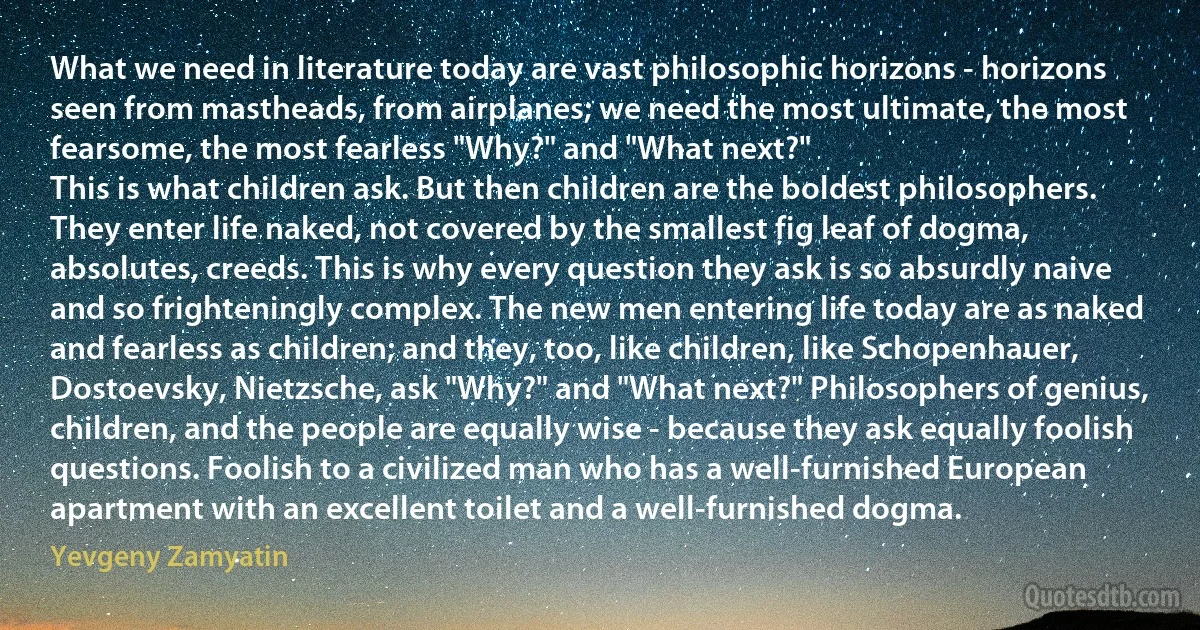
What we need in literature today are vast philosophic horizons - horizons seen from mastheads, from airplanes; we need the most ultimate, the most fearsome, the most fearless "Why?" and "What next?" This is what children ask. But then children are the boldest philosophers. They enter life naked, not covered by the smallest fig leaf of dogma, absolutes, creeds. This is why every question they ask is so absurdly naive and so frighteningly complex. The new men entering life today are as naked and fearless as children; and they, too, like children, like Schopenhauer, Dostoevsky, Nietzsche, ask "Why?" and "What next?" Philosophers of genius, children, and the people are equally wise - because they ask equally foolish questions. Foolish to a civilized man who has a well-furnished European apartment with an excellent toilet and a well-furnished dogma.
Yevgeny ZamyatinRelated topics
apartment ask children complex enter genius men leaf life man need next people question seen ultimate vast wise today schopenhauer nietzsche dostoevsky questionsRelated quotes
Within a system which denies the existence of basic human rights, fear tends to be the order of the day. Fear of imprisonment, fear of torture, fear of death, fear of losing friends, family, property or means of livelihood, fear of poverty, fear of isolation, fear of failure. A most insidious form of fear is that which masquerades as common sense or even wisdom, condemning as foolish, reckless, insignificant or futile the small, daily acts of courage which help to preserve man's self-respect and inherent human dignity. It is not easy for a people conditioned by fear under the iron rule of the principle that might is right to free themselves from the enervating miasma of fear. Yet even under the most crushing state machinery courage rises up again and again, for fear is not the natural state of civilized man.

Aung San Suu Kyi
I soon came to know in the weary debates and the 104 divisions against the European Communities Bill who it was with whom I shared feelings of anger, outrage and hatred at what was being perpetrated. I am aware that the "Left" is supposed to be motivated only by the desire to be unimpeded by "Europe" in converting Britain into a socialist state; but I am compelled to depose that the instincts and reasoning of the "Left" opponents of membership...were exactly as nationalistic, not to say patriotic, as my own...[I part company with Labour only] because of my blind, high Tory ultimate faith in the people. If they are the people I thought and still want to think that they are, those who represent them will assuredly be pulled back in time from the betrayal of their birthright of parliamentary freedom either to a European state or to a Marxist bureaucracy.

Enoch Powell
The mania for self-observation and self-admiration in literature and the view that a work is the more true and the more convincing, the more directly the author reveals himself in it, are part of the intellectual inheritance of Rousseau. In the next hundred to hundred and fifty years everything of importance in European literature is stamped with this subjectivism. Not only Werther, René, Obermann, Adolphe, Jacopo Ortis, are among the successors of Saint-Preux, but also the heroes in later novels- from Balzac's Lucien de Rubempré, Stendhal's Julien Sorel, Flaubert's Frédéric Moreau and Emma Bovary to Tolstoy's Pierre, Proust's Marcel and Thomas Mann's Hans Castorp-are derived from it. They all suffer from the discrepancy between dream and reality and are the victim of the conflict between their illusions and practical, commonplace, middle-class life.

Arnold Hauser
Moreover I want to tell Dr. Süßheim -- who wants to portray every anti-Semite as a psychopath -- about his racial fellow Dr. Otto Weininger, who as an honest Jew wrote down his thoughts in the book "Sex and Character":
"Jewry seems to be somewhat anthropologically related to the Negroes and the Mongolians. To the Negro points the readily curling hair, to an admixture of Mongolian blood points the very Chinese or Malayan formed skull, that one finds so often among Jews, which matches the usually yellowish complexion ... The fact that excellent men have almost always been anti-Semites (Tacitus, Pascal, Voltaire, Goethe, Kant, Jean Paul, Schopenhauer, Grillparzer, Richard Wagner) can be explained in the following way: they, who have so much more in their own nature than other men, can also better understand Jewry."

Julius Streicher
For what advantage is it, that the world enjoys profound peace, if thou art at war with thyself? This then is the peace we should keep. If we have it, nothing from without will be able to harm us. And to this end the public peace contributes no little: whence it is said, ‘That we may lead a quiet and peaceable life.' But if any one is disturbed when there is quiet, he is a miserable creature. Seest thou that He speaks of this peace which I call the third (inner, ed.) kind? Therefore when he has said, ‘that we may lead a quiet and peaceable life,' he does not stop there, but adds ‘in all godliness and honesty.' But we cannot live in godliness and honesty, unless that peace be established. For when curious reasonings disturb our faith, what peace is there? or when spirits of uncleanness, what peace is there?

John Chrysostom
